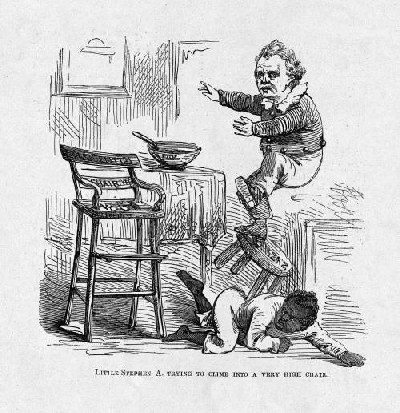I’m not particularly swayed by negative political campaign ads. I think they’re generally in poor taste, and they sure don’t tell you much about either candidate’s platform. If the best thing you can say about your bid for office is “vote for me ’cause my opponent is a bum,” you really aren’t offering much. So, I’m no apologist for negative campaigning.
That said, I think candidates are getting a bit thin-skinned these days. You know it’s getting bad when a grown man trots out his mother to defend him against a subliminal knock on his weight in a TV ad. To read the Journal Star’s “Word on the Street” column today (can’t find it online or I’d link to it), you’d think negative campaigning were something no one had ever seen before. Molly Parker says “enough is enough” — then goes on for three more columns rehashing how terrible these negative ads are.
I wonder what the candidates (and Ms. Parker) would think if their opponents ran this ad against them (from the 1964 presidential election):
Call me crazy, but I’d rather be criticized for my weight than have my opponent claim I’m going to start a nuclear holocaust. That really takes the cake — it goes waaaay beyond “vote for me ’cause my opponent is a bum” to “vote for me ’cause my opponent will start a nuclear war and vaporize your children!” It doesn’t get any more negative than that. Yet, sadly, it worked. Johnson won the election.
Did I say it doesn’t get any more negative? Well, maybe it does. Mike Smith isn’t the first person to have ads poke fun at his physique. Witness this political cartoon from Vanity Fair in 1860:

That’s 5′ 4″ Stephen Douglas being lampooned for being so short. He’s depicted here as a child trying to reach the highchair of the presidency. To make matters worse, he’s balancing on a stool on the back of a black boy to get there — a reference to the Kansas-Nebraska Act of 1854, which Douglas (an Illinois senator!) had proposed and which ultimately passed Congress. That’s another story, not germane to this post. My only point is that this was quite inflammatory — way more inflammatory than the kinds of ads we’re seeing today.
And those are only two examples. Believe me, the political ads of today are a love fest compared to the past.

A few of these candidates almost have to rely on negative campaigning because their record is so lackluster and would have to really stretch the truth for them to appear impressive.
I see both sides of the issue. If I was running for political office, I could go on and on about what I was going to do for you, and spend plenty of money for advertising and campaigning to get my message out. Or, take a real serious subject that strikes you soo hard emotionally…that you would not even have to remember a thing about me, because you are NOT voting for that person. Negative ads, to me are more reasons not to vote for you, and somewhat represent your strategical demeanor, and shortcomings. But, thats given that political representatives are gentle, kind, and honest people. Some are. But the majority of acting political party members have a different agenda. The truth is that the attack ads are carefully designed and go through a testing strategy, and music is used to combine different elements to get into your head and mislead you. After all, one cannot honestly believe that one person finds child predators to be favorable to society. But, if I put you into a trance with music and emotion and powerful words, and put the blame on you for not voting the other way, by implying you are just like him. You get scared, and fear allows me to take your mind away for a little while. ——-Thats just my personal view.
The Johnson campaign against Goldwater was especially vicious.
there is nothing negative about stating the facts about your opponent’s record, unless, of course, you are the opponent and don’t want the voters to know your record. It may seem a game at times, and the people playing are, as a lot, pretty sleazy, but politics is serious business. Voters have a right to know who they are being asked to vote for.